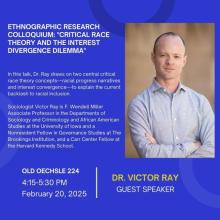
In this talk, Dr. Ray draws on two central critical race theory concepts—racial progress narratives and interest convergence—to explain the current backlash to racial inclusion. The democracy-enhancing successes of the Civil Rights Movement were, in part, a response to Cold War imperatives. Political exigencies, including the need to counter effective Soviet propaganda that capitalized on American racial hypocrisy, led elites to favor integration despite the potential domestic political costs. Analyzing this process, Derrick Bell developed his highly influential interest convergence thesis, arguing that racial progress was likely only when white and black interests aligned. Converging interests transformed American organizations as schools, churches, and businesses incorporated formerly excluded people of color. Ray argues that the rise of autocratic regimes abroad has created a political opportunity structure deepening domestic polarization and threatening to reverse the progress organizations have made towards diversifying. External Cold War era checks on American authoritarianism that were central to the success of the Civil Rights Movement have broken down as autocracies have risen globally. Contemporary levels of polarization signal that we have entered a period of "interest divergence" as some Americans—empowered and inspired by international authoritarian movements—have abandoned the project of multi-racial democracy.
Sociologist Victor Ray is F. Wendell Miller Associate Professor in the Departments of Sociology and Criminology and African American Studies at the University of Iowa and a Nonresident Fellow in Governance Studies at The Brookings Institution, and a Carr Center Fellow at the Harvard Kennedy School.


